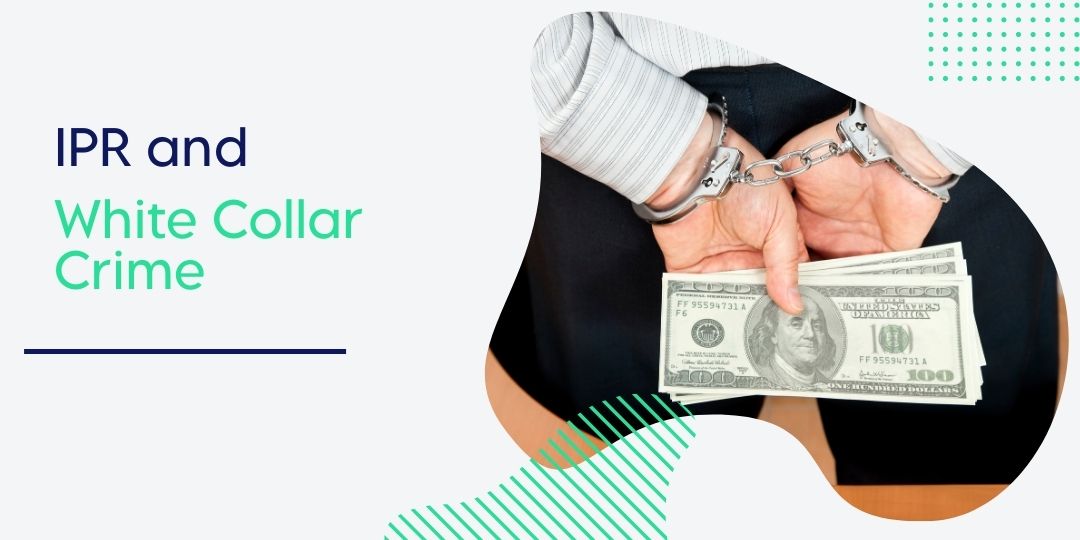IPR AND WHITE COLLAR CRIME

N. Vignesh Kumaran
Senior Associate & Patent Agent, Intellectual Property Practice
IPR
Intellectual property (IP) includes intangible creations of the human intellect, which can be an idea, invention, literary creation, unique name, business method, industrial process, chemical formula, and computer program. The IP is considered an important part of economic, social, and cultural development, laws have been created throughout the world to define and protect the rights of those who develop IP through patents, copyrights, trademarks, and trade secrets, and are enforced primarily through civil action and criminal prosecution.
WHITE COLLAR CRIME
White-collar crime is commonly known as financially motivated, nonviolent crime committed by businesses and government professionals.The sociologist Edwin Sutherland in 1939 defined the white collar crime as “a crime committed by a person of respectability and high social status in the course of their occupation”1.
WHO ENFORCES WHITE-COLLAR CRIME LAWS?
There are many government enforcement agencies that perform investigations to determine whether individuals are committing the white-collar crimes. Corporations also employ internal investigators, attorneys, or private detective agencies to investigate to determine whether any directors, management, or individuals in connection with the corporation are committing criminal activities.
Types of White Collar Crimes2
Some of the white collar crime are as follows:
- Bank Fraud: Bank Fraud means to engage in such activities in order to defraud a bank or using illegal means to obtain assets held by financial institutions.
- Blackmail: Blackmail means demand for money by threatening some person to cause physical injury or exposing his secrets.
- Bribery: Bribery means offering money, goods or any gift to someone in order to have control over his actions. It is a crime whether someone offers or accepts a bribe.
1– https://en.wikipedia.org/wiki/White-collar_crime
2- https://blog.ipleaders.in/analysis-white-collar-crimes-india/
- Computer Fraud: Computer frauds are such frauds which involve hacking or stealing information of some other person.
- Embezzlement: When someone entrusted with money or property uses it for his own use, it is embezzlement.
- Extortion: When a person illegally obtains someone’s property by actual or threatened force.
- Insider-Trading: When someone uses the confidential information to trade in shares of publicly held corporations.
- Money-Laundering: Money Laundering means the concealment of origin of illegally obtained money.
- Tax fraud: Tax fraud means evading tax by providing wrong information in tax forms or illegally transferring property in order to avoid tax.
What Is Intellectual Property Theft ?
The White collar crime covers a number of facets and different types of crimes. One of those crimes is intellectual property theft, which is stealing or using someone else’s intellectual property and work without permission. This can cover a broad array of crimes and properties, from creative or commercial innovation to any type of property with economic value.3
Theft of intellectual property happens when someone knowingly uses, takes, steals, or misappropriates any property that falls under the protection of laws surrounding intellectual property. What are the most common types of intellectual property theft?
-Music
-Inventions
-Literary Works
-Artwork
-Design
-Symbols
These types of intellectual properties are protected by patents, copyrights, and trademarks law. In today’s digital world, intellectual property theft has become a bigger threat and a common form of the white-collar federal crime. Streaming services, piracy, and file-sharing networks have aided in the ease of this type of theft to occur. If you’ve become a victim of intellectual theft, there are a few paths for you to consider.
Sometimes, the person who has committed the theft has done so unknowingly, and they will cease to stop using the intellectual property or agree to pay for any misuse of the intellectual property. If this doesn’t happen, then legal action will be taken against him. The thief in this instance benefits from work without producing the work, whether that’s a financial benefit or other types of benefit.
What types of intellectual property theft are there?3
- Copyrighted Material
Copyright infringement or theft is the use or production of copyright-protected material without the permission of the author of the copyrighted material. The copyrighted material includes software, books, photographs, paintings, and poems.
- Patented Material
Generally, a patent for an invention is granted by government to the inventor, giving the inventor the right to stop others, for a limited period, from making, using or selling the invention without their permission. Copying the patented technology products or process and using it without a patent applicant’s permission is considered as patent theft or infringing.
- Trademarked Material
There are a limited number of items that can be trademarked. Designs that identify as a brand, words, symbols, and phrases are used to identify as a trademark ™. Unauthorised use of the registered trademark in any form without registered proprietor permission is considered as TM theft or infringing.
- Trade Secret
A piece of information that is not generally known to the public or competitors, but valuable to a business. These secrets are kept confidential, though if exposed can result in severe damages to a business. Thus, unauthorized exposure of the trade secret is known as theft or infringement.
3- https://aggressivedefense.com/white-collar-criminal-offense-what-is-intellectual-property-theft/
Crimes related to IPR and White Collar Crimes
Violations of IPR are often classified as a white collar theft or fraud. For example, illegal reproduction of a movie for the aim of selling counterfeit copies to others for profit may be a white collar crime (WCC) because it involves the violation of copyright rights through deception, or fraud, for business or personal advantage.
The sale of counterfeited patented drugs also involves deception about the manufacturer or content for illegal gain, and therefore the illegal use of a secret to develop a marketable product involves deception concerning truth ownership of a thought or information. Additionally, IPR violations are often wont to facilitate other WCCs, such as 4:
- Investment fraud (e.g., employing a trademark of a legitimate company to deceive investors);
- concealment (e.g., concealing funds acquired from counterfeit goods sales);
- Fraudulent sales (e.g., creating a bogus internet site to deceive customers);
- fraud (e.g., using personal information acquired from a misappropriated database or solicited employing a misappropriated trademark of a legitimate company);
- Other online scams (e.g., fraudulently acquiring donations using the seal of the registered trademark company);
- Racketeering (e.g., organised efforts to misappropriate IP); and
- evasion (e.g., failing to report income acquired through IP violations).
Defence for the intellectual property theft
An attorney can attempt following actions as defence in case of the intellectual property theft:
- to prove lack of intent that shows the accused did not intend or knowingly steal the property for personal gain or they could try to prove ownership rights where the accuser doesn’t have ownership rights of the property and therefore cannot sue.
- to prove fair use under the fair use clause where the use of intellectual property is permitted for educational purposes.
Punishment for the intellectual property theft
If you’re caught stealing intellectual property, you will be punished with a potential of years in prison and extensive fines with a permanent criminal record. There are severe long-term consequences which could prohibit someone from attaining a job, an apartment, and more.
White Collar Crimes in India
The White Collar Crimes are rapidly increasing in India with the advancement of commerce and technology. The recent developments in the technology have given new dimensions to computer related crimes known as cyber crimes. As such, the white collar crimes are increasing with the development of new websites. The areas affected by these crimes are banking and financial institutions, industry, business etc 5.
Thus crime is an act or omission which constitutes an offence and is punishable under the law. As the white collar crimes are increasing on a daily basis, it injures society on a large scale because the laws are not properly administered and therefore there is a need to curb the factors that are helping in the commission of such crimes.
Section 63 of the Copyright Act, 1957 states that if any person who knowingly infringes or abets the infringement of the copyright in any work, such a person commits an offence punishable with imprisonment and fine. Also in M/s. Knit Pro International vs. State of NCT of Delhi & Anr., the Supreme Court of India held that Section 63 of the Copyright Act is a non-bailable offence.
5- https://indianlawportal.co.in/white-collar-crimes-in-india/
Conclusion:
In this digital world, law should be amended or structured to protect from white collar crimes in the intellectual property rights.



